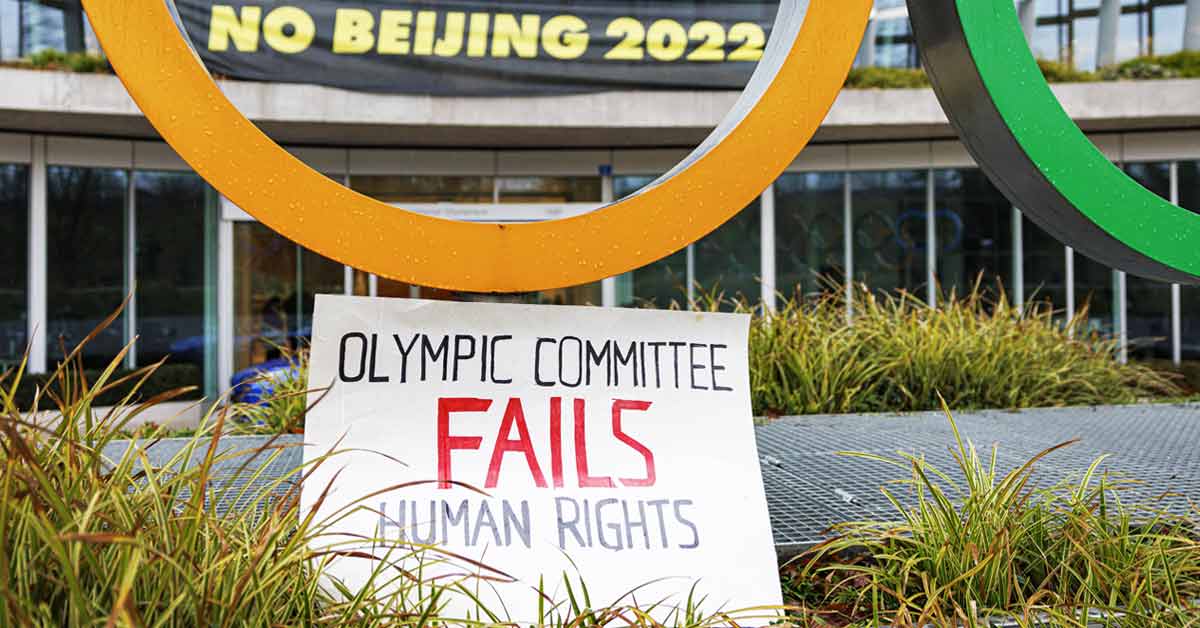The first modern Olympics took place in 1896 in Athens, and featured 280 participants from 12 nations, competing in 43 events. Since 1994, the Summer and Winter Olympic Games have been held separately and have alternated every two years. The 2020 Summer Olympics was held from 23 July to 8 August, 2021, in Tokyo, Japan, and the upcoming Winter Olympics will be held from 4 to 20 February, 2022 in Beijing, China.
Historically, the Olympic Games, which originated in ancient Greece as far back as 3,000 years ago, is the world’s most prestigious and renowned sporting competition.
From the 8th century B.C. to the 4th century A.D., the Olympic Games were held every four years in Olympia, located in the western Peloponnese peninsula, in honour of the Greek god Zeus. Every four years, people from all around Greece travelled to Olympia to witness the grandest competitive games in antiquity. And to safeguard those traveling to and from Olympia, hostilities were banned for the duration of the Olympic Games.
A "sacred truce" or ékécheiria, meaning "laying down of arms" was observed before and during the Olympic Games. During the time of ancient Greece, the “truce” served as an assurance and guarantee that the host city-state (Elis) was not attacked and athletes and spectators could travel safely to the Games and peacefully return to their respective countries. The forging of this “truce” in this day and age remains relevant.
The 76th session of the United Nations General Assembly (UNGA) in New York recently adopted the Beijing Winter Olympic Truce Resolution drafted by China and the International Olympic Committee (IOC). It was adopted by consensus and co-sponsored by 173 member states which signifies the support of the international community for the Beijing Winter Olympics and the International Olympic Movement.
The resolution, titled, "Building A Peaceful And Better World Through Sport and the Olympic Ideal," calls for observing the tradition of the Olympic Truce, for seven days before the Beijing 2022 Olympics begins on 4 February, 2022 until seven days after the Paralympic Games end on 13 March, 2022.
The said resolution basically "calls upon all UN Member States to cooperate with the International Olympic Committee and the International Paralympic Committee in their efforts to use sport as a tool to promote peace, dialogue, and reconciliation in areas of conflict during and beyond the period of the Olympic and Paralympic Games."
Politicisation
After the two-day US-led Democracy Summit, the Biden administration announced a diplomatic boycott of the 2022 Winter Olympics in China, which means that the US will not send any diplomatic or official representation to the Beijing 2022 Winter Olympics and Paralympic Games, citing China’s alleged ongoing genocide and crimes against humanity in Xinjiang, and other human rights abuses” according to White House Press Secretary Jen Psaki. However, US athletes will attend the Games with the full support of the US government.
Countries like the United Kingdom (UK), Australia, Canada, and Lithuania have followed suit and joined the fray, citing the same reasons stated by the US. Such a move coming from the US and its western allies has been heavily criticized by Beijing and other countries like Cuba, Russia, Argentina, and even France.
The Cuban Olympic Committee (COC) condemned the politicisation of the upcoming 2022 Beijing Winter Olympics. “The use of sports events as platforms of political pressure must come to an end. The COC also calls on the Olympic Committees from all over the world to come together for Winter and Summer Olympiads for peace, solidarity, and friendship.”
“Our position is that the Olympic Games should be free of politics,” Kremlin spokesperson Dmitry Peskov said. Whereas, Chinese officials said that “The Winter Olympic Games is not a stage for political posturing and manipulation.”
France will not join the diplomatic boycott of other Western countries. French President Emmanuel Macron said that he would rather work with the IOC on the protection of athletes around the world than engage in "insignificant" boycotts. "We must not politicise the Olympics," Macron told a press conference. "As with all things on the international stage, I prefer to do things that have a useful effect."
Argentina's Sports Minister Matías Lammens has announced his country's full support of the Beijing Winter Olympic Games. UN Secretary-General Antonio Guterres will attend the Beijing Winter Olympics in the same manner that Russian President Vladimir Putin has accepted an invitation to the Beijing 2022 Winter Olympic Opening Ceremony.
Curiously, the US, UK, Canada, and Australia were not even invited to the 2022 Olympics according to Chinese Foreign Ministry spokesman Wang Wenbin at a regular press briefing in Beijing on 9 December, 2021.
Weaponizing Human Rights
It seems that the US together with its western allies are not only politicising the upcoming Beijing Winter Olympics but weaponizing human rights ahead of the global competition. It is as if the US has the moral ascendancy and the credibility to lecture countries like China about human rights issues when it is faced with an alarming human rights situation domestically.
US unilateral actions against other countries in various parts of the globe as a result of its brand of democracy through “regime change”, has not only produced staggering human rights violations in these countries, but chaos, loss of lives, massive humanitarian crises, and displacement of people. Indeed, the disastrous impact of foreign wars waged by the US is thus far unprecedented.
For instance, since the end of the Second World War, from 1945 to 2001, out of the 248 armed conflicts that had happened in 153 regions of the world, 201 were staged and waged by the US.
Examples include airstrikes in Libya which caused 700 military and civilian deaths. The Syrian War brought forth more than 40,000 civilian deaths and 12.59 million refugees, while the Gulf War led to two million sanctioned-related civilian deaths, 120 civilian deaths, and US$600 billion in economic losses. The invasion of Panama led to 302 civilian deaths and injuries.
The Iraq War on the other hand caused more or less 250,000 civilian deaths and 3.25 million refugees. Whereas the War on Afghanistan brought forth more than 30,000 civilian deaths, more than 70,000 civilian injuries, and more than 11 million refugees. These are just a few examples of the consequences of US unilateral military actions and interventions in many parts of the globe that violated the human rights of these countries and their peoples.
Domestically, the US since 1619 has had to deal with the issue of slavery of African-Americans. It has also committed atrocities on the level of racial genocide when it slaughtered native Americans (American Indians) in the name of civilisation.
In contemporary times, the human rights situation in the US is likewise alarming. The latest UN human rights report on the US reflects the general concern of the international community over the continuing deterioration of the human rights of minority groups in the country.
The said report observed that it is becoming unfortunately apparent that it is almost a tyranny of the majority over the minority with systemic discrimination against minority groups in many areas including electoral rights, education, religion, criminal justice, and hate crimes. It noted that anti-Semitism, anti-Asian speech, Islamophobia, discrimination in various forms against African-Americans, Latinos, and even Asian communities, and anti-immigration xenophobia are on the rise.
Furthermore, the gap between the rich and the poor is widening at unprecedented levels, with the people at the bottom of society living in misery. The COVID-19 situation in the US has led to mass unemployment. Inflation in the US soared to nearly a 40-year high of 6.8 percent in November 2021, causing the cost of living to rise to an unprecedented level and putting more pressure on American households due to rising prices of gas, food, cars, rents, etc.
Tens of millions of Americans have no access to universal healthcare insurance and coverage. Many Americans are experiencing hunger and are living on the streets or in tents. These are just some of the economic rights issues that Americans are facing these days which indicate that indeed the human rights situation in the US is quite alarming.
Nonetheless, the US government, instead of solving and responding to its deteriorating human rights situation at home and the backsliding of its brand of liberal democracy, is preoccupied instead with lecturing other countries like China, Russia on human rights; revealing its double standards and hypocrisy.
Conclusion
In retrospect, instead of upholding the Olympic creed – “The Olympic Games give us the chance to celebrate our shared humanity, and the object of the competitors should be to express this humanity by performing fairly and honestly to the best of their natural ability.” – and instead of advocating for the Olympic spirit, which embodies the promotion of mutual understanding with a spirit of friendship, solidarity, and fair play among athletes and delegates of different nationalities, the US is using the 2022 Beijing Winter Olympics as a flashpoint to escalate global tensions and to create a Cold War-like atmosphere between itself and China.
The US, rather than meddling in the affairs of other countries, should start solving its domestic human rights problems and issues and stop applying double standards and hypocrisy vis-à-vis world events like the 2022 Beijing Winter Olympics, which is a non-political international gathering of athletes of various nationalities.
The Olympic Games should be seen as being above politics and considered as a venue that facilitates greater understanding, cooperation, and friendship among nationalities and countries across the globe in the name of world peace and solidarity.
The views expressed in this article are the author’s own and do not necessarily reflect those of The ASEAN Post.

